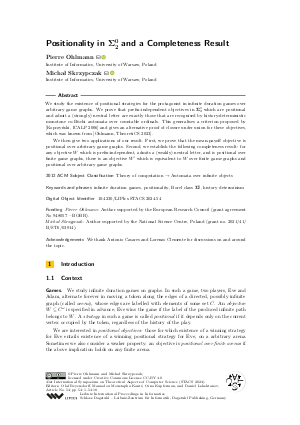@InProceedings{ohlmann_et_al:LIPIcs.STACS.2024.54,
author = {Ohlmann, Pierre and Skrzypczak, Micha{\l}},
title = {{Positionality in \Sigma⁰₂ and a Completeness Result}},
booktitle = {41st International Symposium on Theoretical Aspects of Computer Science (STACS 2024)},
pages = {54:1--54:18},
series = {Leibniz International Proceedings in Informatics (LIPIcs)},
ISBN = {978-3-95977-311-9},
ISSN = {1868-8969},
year = {2024},
volume = {289},
editor = {Beyersdorff, Olaf and Kant\'{e}, Mamadou Moustapha and Kupferman, Orna and Lokshtanov, Daniel},
publisher = {Schloss Dagstuhl -- Leibniz-Zentrum f{\"u}r Informatik},
address = {Dagstuhl, Germany},
URL = {https://drops.dagstuhl.de/entities/document/10.4230/LIPIcs.STACS.2024.54},
URN = {urn:nbn:de:0030-drops-197643},
doi = {10.4230/LIPIcs.STACS.2024.54},
annote = {Keywords: infinite duration games, positionality, Borel class \Sigma⁰₂, history determinism}
}

 Creative Commons Attribution 4.0 International license
Creative Commons Attribution 4.0 International license










